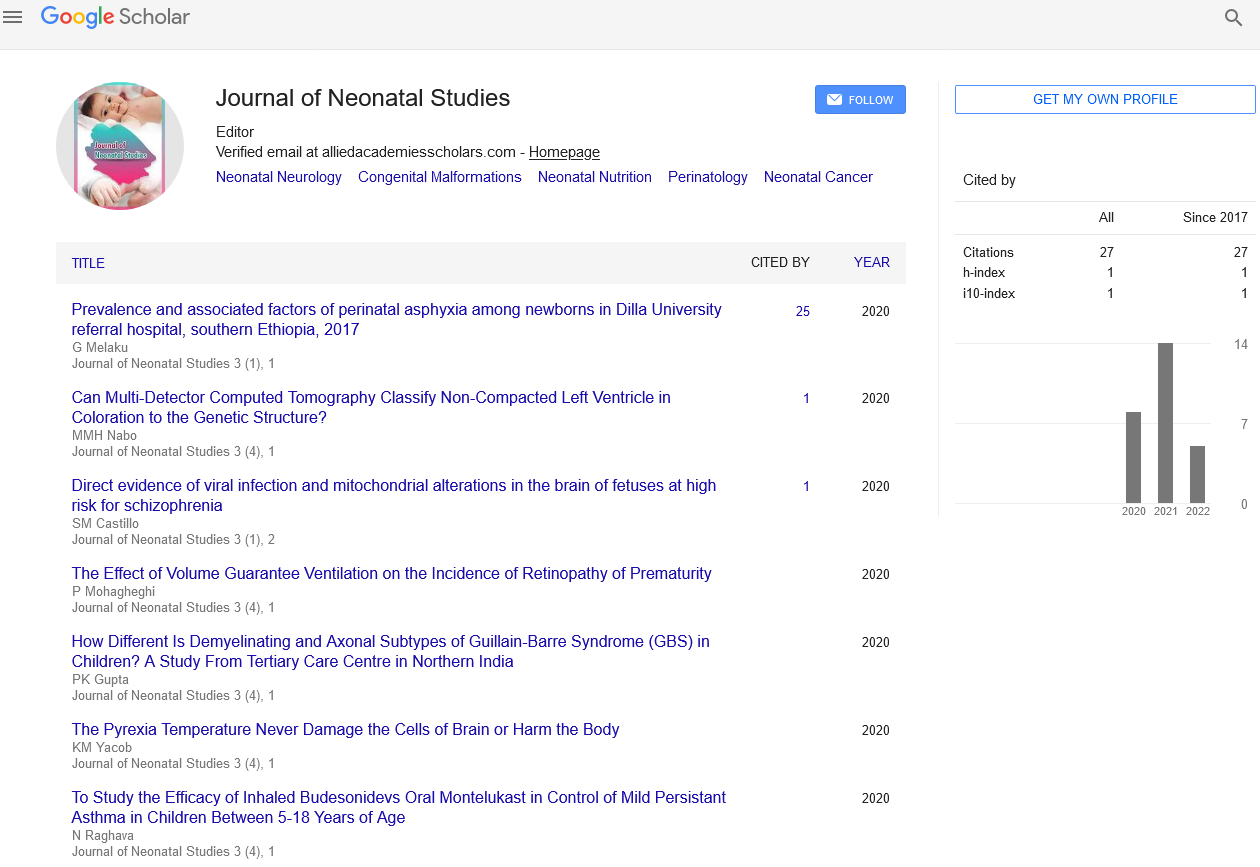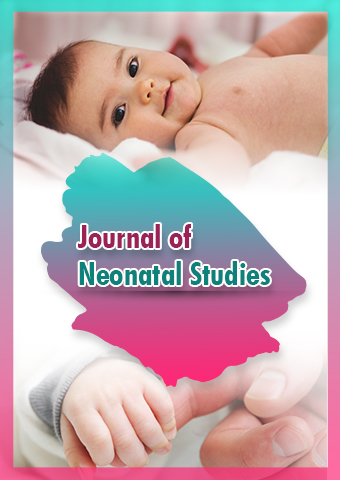Opinion Article - Journal of Neonatal Studies (2024) Volume 7, Issue 5
Neonatal-Perinatal Medicine: Ensuring the Health of Mothers and Newborns
- Corresponding Author:
- Mikhail Lev
Department of Maternal and Perinatal Medicine, Crimea State Medical University, Russia
E-mail: miklev91@yahoo.com
Received: 02-Sep-2024, Manuscript No. JNS-24-150536; Editor assigned: 04-Sep-2024, PreQC No. JNS-24-150536 (PQ); Reviewed: 18-Sep-2024, QC No. JNS-24-150536; Revised: 23-Oct-2024, Manuscript No. JNS-24-150536 (R); Published: 30-Oct-2024, DOI: 10.37532/JNS.2024.7(5).285-287
Introduction
Neonatal-perinatal medicine is a subspecialty of pediatrics and obstetrics that focuses on the comprehensive care of critically ill newborns and the management of high-risk pregnancies. This field addresses the health concerns of both the mother and the infant during the perinatal period, which spans from the time before birth through the immediate postnatal period. This article explores the scope, importance, and advancements in neonatal-perinatal medicine, highlighting the roles of healthcare providers and the impact of this specialty on maternal and newborn health.
Description
Scope of neonatal-perinatal medicine
Neonatal-perinatal Medicine encompasses two main areas:
Neonatology: Focuses on the medical care of newborns, especially those who are ill or born prematurely. Neonatologists manage various conditions affecting newborns, including respiratory distress, infections, congenital anomalies, and other complications.
Perinatology (Maternal-fetal medicine): Concentrates on the health of the mother and fetus during high-risk pregnancies. Perinatologists or maternal-fetal medicine specialists are trained to handle complications that may arise during pregnancy, labor, and delivery, ensuring the best outcomes for both the mother and the baby.
Importance of neonatal-perinatal medicine
The perinatal period is a critical time for both the mother and the newborn. Effective management during this period can significantly impact long-term health outcomes. The importance of neonatal-perinatal medicine includes:
Reducing neonatal mortality: By providing specialized care to critically ill and preterm infants, neonatal-perinatal medicine helps reduce neonatal mortality rates. Advanced interventions and technologies in NICUs have contributed to higher survival rates for preterm and low birth weight infants.
Improving maternal health: Managing high-risk pregnancies ensures that mothers receive appropriate care for conditions such as preeclampsia, gestational diabetes, and multiple pregnancies. This care helps prevent complications during labor and delivery.
Preventing long-term complications: Early detection and management of neonatal conditions can prevent long-term complications, such as neurodevelopmental delays, chronic lung disease, and other health issues. Neonatal-perinatal medicine focuses on promoting healthy development from the earliest stages of life.
Key conditions managed in neonatal-perinatal medicine
Prematurity: Infants born before 37 weeks of gestation are considered premature and are at higher risk for various complications, including Respiratory Distress Syndrome (RDS), Intraventricular Hemorrhage (IVH), and Necrotizing Enterocolitis (NEC). Neonatologists provide specialized care to support the growth and development of preterm infants.
Respiratory Distress Syndrome (RDS): A common condition in preterm infants caused by insufficient surfactant production in the lungs. Surfactant therapy, along with respiratory support such as CPAP or mechanical ventilation, is used to manage RDS.
Infections and sepsis: Neonatal infections, including sepsis, can be life-threatening. Early diagnosis and prompt antibiotic treatment are essential to manage infections in newborns.
The role of healthcare providers in neonatal-perinatal medicine
Neonatal-perinatal Medicine involves a multidisciplinary team of healthcare providers who collaborate to provide comprehensive care. Key members of the team include:
Neonatologists: Pediatricians with specialized training in neonatal care who oversee the medical management of critically ill newborns. They coordinate the care team, develop treatment plans, and perform complex procedures.
Dietitians: Specialized dietitians develop nutrition plans tailored to the needs of preterm and critically ill infants. They ensure that infants receive the appropriate nutrients for growth and development.
Social workers and psychologists: Mental health professionals who offer emotional support and counseling to families. They help parents cope with the stress of having a critically ill infant and connect them with resources and support services.
Advancements in neonatal-perinatal medicine
Recent advancements in neonatal-perinatal medicine have significantly improved outcomes for mothers and newborns. Some notable advancements include:
Surfactant therapy: The introduction of surfactant therapy has revolutionized the management of RDS in preterm infants. Surfactant replacement therapy helps improve lung function and reduce the need for mechanical ventilation.
Therapeutic hypothermia: Cooling therapy used to treat infants with HIE has shown to improve neurodevelopmental outcomes. By reducing brain temperature, therapeutic hypothermia helps prevent further brain injury.
Minimally invasive surgery: Advances in minimally invasive surgical techniques allow for the repair of congenital anomalies with reduced risk and faster recovery times.
Genetic and genomic medicine: Genetic testing and genomic analysis provide valuable insights into the underlying causes of certain conditions, allowing for personalized treatment plans and early interventions.
Family-centered care in neonatal-perinatal medicine
Family-centered care is a fundamental principle in neonatal-perinatal medicine. Involving families in the care of their infants is essential for promoting positive outcomes. Key aspects of family-centered care include:
Kangaroo care: Promoting skin-to-skin contact between parents and their infants. Kangaroo care has been shown to improve bonding, stabilize vital signs, and promote breastfeeding.
Communication and education: Providing clear and consistent communication with parents about their infant’s condition, treatment plan, and progress. Offering educational resources and support groups helps parents navigate the challenges of having a critically ill infant.
Support services: Offering services such as counseling, social work, and financial assistance to address the emotional and practical needs of families.
Challenges in neonatal-perinatal medicine
Despite significant advancements, neonatal-perinatal medicine faces several challenges:
Resource constraints: Limited availability of specialized care facilities and equipment can impact the ability to provide timely and appropriate care for all high-risk pregnancies and critically ill newborns.
Staffing shortages: Shortages of trained healthcare professionals in neonatal-perinatal medicine can strain existing staff and affect the quality of care.
Parental stress: The experience of having a high-risk pregnancy or a critically ill infant can be emotionally overwhelming for parents. Providing adequate support and resources to families is essential for their well-being.
Research and future directions
Ongoing research and innovation continue to drive advancements in neonatal-perinatal medicine. Some areas of focus include:
Advancements in technology: Developing new medical devices and monitoring systems that provide more precise and less invasive care for mothers and infants.
Genetic and genomic research: Exploring the genetic factors that contribute to maternal and neonatal conditions and developing targeted therapies based on genetic insights.
Improving family-centered care: Enhancing support services and resources for families to ensure their active involvement in their infant’s care and well-being.
Conclusion
Neonatal-Perinatal Medicine plays a vital role in ensuring the health and well-being of mothers and newborns during the critical perinatal period. Through advanced medical technology, multidisciplinary teamwork, and a commitment to family-centered care, healthcare providers in this specialty strive to achieve the best possible outcomes for high-risk pregnancies and critically ill infants. Continued research, innovation, and support for families are essential for advancing neonatal-perinatal medicine and improving the health and well-being of mothers and newborns worldwide.

